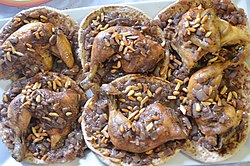 | |
| Course | Meal |
|---|---|
| Place of origin | Palestine |
| Region or state | Levant |
| Associated cuisine | Palestinian, Levantine |
| Main ingredients | Chicken, sumac, onion, taboon bread, olive oil |
Musakhan (Arabic: مسخّن, lit. 'something that is [re]heated'),[1] also known as muhammar (Arabic: محمّر, lit. 'reddish'), is a Palestinian dish composed of roasted chicken baked with onions, sumac, allspice, saffron, and fried pine nuts served over taboon bread. Originating in the Tulkarm and Jenin area,[2] musakhan is often considered the national dish of Palestine. The dish is particularly popular among Palestinians, Israeli Arabs and Jordanians.[3] It is also eaten by Arabs and Druze in Galilee, especially around Iksal and Sandala, and in the Triangle.[4][5] The dish can be found in Syria, Lebanon and Jordan as well.[3] The dish owes its name to the practice of Palestinian farmers to reheat old taboon bread and make it taste better.[6]
Musakhan is simple to make and the ingredients needed are easily obtainable, which may account for the dish's popularity. Many of the ingredients used—olive oil, sumac and pine nuts—are staples of Palestinian cuisine. The dish is typically eaten with one's hands. It is usually presented with the chicken on top of the bread, and could be served with soup.
- ^ "Recipe: Musakhkhan (Arab Levant, Palestine) Musakhkhan". www.cliffordawright.com. Archived from the original on 12 June 2017. Retrieved 24 April 2018.
- ^ Albala, Ken. Food Cultures of the World Encyclopedia [4 volumes]: [Four Volumes]. p. 293.
- ^ a b Ghillie Basan (January 2007). The Middle Eastern Kitchen. Hippocrene Books. pp. 189–. ISBN 978-0-7818-1190-3.
- ^ Trevor Mostyn (1983). Jordan: A Meed Practical Guide. Middle East Economic Digest Limited. ISBN 978-0-9505211-8-3.
- ^ Haaretz (10 November 2014). "After Death Threats, Palestinian Food-serving U.S. Restaurant Closes". Haaretz. Archived from the original on 1 December 2017. Retrieved 24 April 2018.
- ^ Kassis, Reem (2023). We Are Palestinian: A Celebration of Culture and Tradition. Bonnier Books Ltd. ISBN 9781800783287.